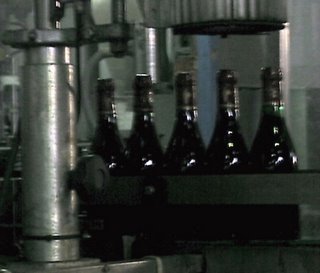Winemaking at Bou Argoub
 Since viticulture has such a long history in the Cap Bon region, I visited the nearby fabrique (factory) near the small city of Bou Argoub. I arrived as a group of students from the Higher Institute for Technological Studies of Nabeul were beginning a tour, so I got to join them. The students, nine women and four men, are planning to go into tourist industry. Two male students and two female walked or stood arm in arm at times. This is a simple act of friendship in Tunisia. In Tunisia, over half of the university students are women.
Since viticulture has such a long history in the Cap Bon region, I visited the nearby fabrique (factory) near the small city of Bou Argoub. I arrived as a group of students from the Higher Institute for Technological Studies of Nabeul were beginning a tour, so I got to join them. The students, nine women and four men, are planning to go into tourist industry. Two male students and two female walked or stood arm in arm at times. This is a simple act of friendship in Tunisia. In Tunisia, over half of the university students are women.Agriculture plays a predominant role in the Tunisian economy; and the country has a long tradition of viticulture. In an agronomical essay, a Punic leader, Magon, celebrated the wines of Numidia. In Roman times, festivals in tribute to Dionysus took place. Symbols related to the pleasures of the vine appear in mosaics in Utica and Bulla Regia. Tunisia continues its history of wine production, building on the days when amphoras, wedged in the bottom of boats, traversed the Mediterranean.
On the way to the location, I asked Farid, the taxi driver, if he had any children. At first, he tried to ignore the question. Upon further questioning, he said that he didn’t have any, he had four girls. As we drove, he pointed out that some houses remain unfinished on the outside, so the proprietors don’t have to pay as much in taxes. Farid thought that at least 45 percent of Tunisians drink wine, although Islam forbids its consumption. He also said he would never go to Algeria, even if someone paid him to. He had a video screen, attachable to his dashboard, and a collection of CDs. About 5' 4", I think he tried to cut a bit of a dashing figure with his red shirt and beige scarf tossed over his shoulder.
Tunisia isn’t in competition with Napa Valley, or Australia or Chile; but it does make some good wines with what resources it has and even exports them to European countries.


0 Comments:
Post a Comment
<< Home